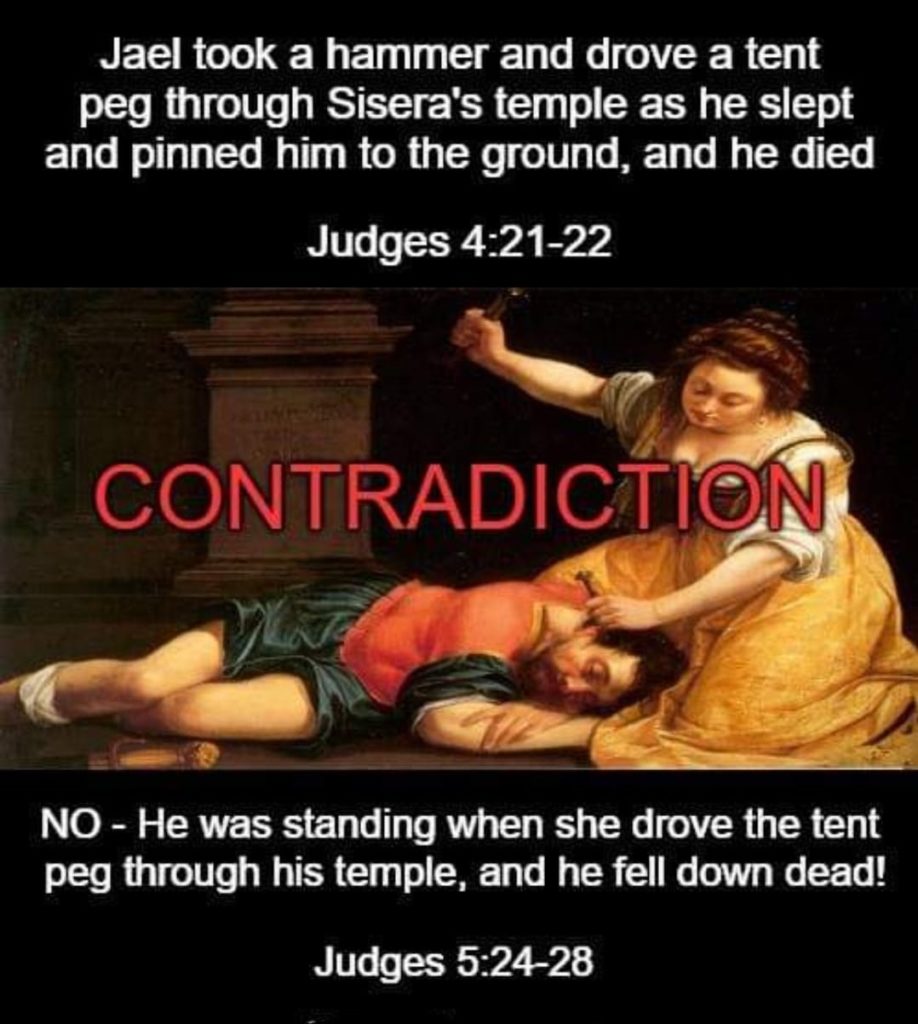
They get really emotional when I call them a monkey. They think a black man should never call another black man that, but its okay for us to call each other ni&&a. Go figure. I don’t care what race you are. If you act like a monkey that is what I will call you: white, black, green, yellow, beige, brown, etc. Makes no difference to me, you will be a monkey until I say otherwise. I do not discriminate when it comes to my ad-hominem. I am an equal opportunity distributor of unacceptable inflammatory rhetoric. It’s never about race (almost never). It’s always about their lack of intelligence, and especially their dishonest and reprehensible tactics like this meme above.
Judges 5:27 does not contradict Judges 4:21. It only appears that way because the creator of this meme is an illiterate monkey who cannot speak, read, or parse out the source language of Ghabaray (i.e. Biblical Hebrew). He or she is banking on the English mis-translation which was made by monkeys 400 years ago in 17th century England.
“At her feet he bowed, he fell, he lay down: at her feet he bowed, he fell: where he bowed, there he fell down dead” (Judges 5:27 – 1611 Queen James Virus).
Let’s fix this mis-translation of Judges 5:27 and silence the monkeys by parsing out the verse word for word.
בין רגליה כרע נפל שכב בין רגליה כרע נפל באשר כרע שם נפל שדוד
bayn /בין
prepostion: בין, “between”
ragalay-ha /רגליה
feminine noun, dual, construct: רגלי, “feet of”
pronominal suffix 3rd person, feminine, singular: ה, “her”
charai /כרע
Stative verb, basic stem, perfect aspect, 3rd person, masculine, singular: “he was prostrated”
Stative verbs describe a state of being rather than an action.
napal /נפל
Non-stative verb, basic stem, perfect aspect, 3rd person, masculine, singular: “he died”
Non-stative verbs describe an action rather than a state. This non-stative verb is the exact same non-stative verb that is used in Genesis 25:18, “he died”.
shachab /שכב
Stative verb, basic stem, perfect aspect, 3rd person, masculine, singular: “he was lying down”
Stative verbs describe a state of being rather than an action.
bayn /בין
prepostion: בין, “between”
ragalay-ha /רגליה
feminine noun, dual, construct: רגלי, “feet of”
pronominal suffix 3rd person, feminine, singular: ה, “her”
charai /כרע
Stative verb, basic stem, perfect aspect, 3rd person, masculine, singular: “he was prostrated”
Stative verbs describe a state of being rather than an action.
napal /נפל
Non-stative verb, basic stem, perfect aspect, 3rd person, masculine, singular: “he died”
Non-stative verbs describe an action rather than a state. This non-stative verb is the exact same non-stative verb that is used in Genesis 25:18, “he died”.
ba-ashar /באשר
preposition: ב, “in the”
relative particle: אשר, “position which”
charai /כרע
Stative verb, basic stem, perfect aspect, 3rd person, masculine, singular: “he was prostrated”
Stative verbs describe a state of being rather than an action.
sham /שם
adverb: “there”
napal /נפל
Non-stative verb, basic stem, perfect aspect, 3rd person, masculine, singular: “he died”
Non-stative verbs describe an action rather than a state. This non-stative verb is the exact same non-stative verb that is used in Genesis 25:18, “he died”.
shadod /שדוד
passive participle (noun): “violently despoiled”
A participle is a noun where the subject is either doing an action (active) or receiving an action (passive).
Correct translation:
“Between her feet he was prostrated, he died, he was lying down, between her feet he was prostrated, he died in the position which he was prostrated, there he died, violently despoiled.”
Our books have been under attack by monkeys for centuries. If you do not know the pure language and can’t read the book for yourself it is easy for monkeys to make you see contradictions that don’t actually exist. Don’t be a monkey like them.
